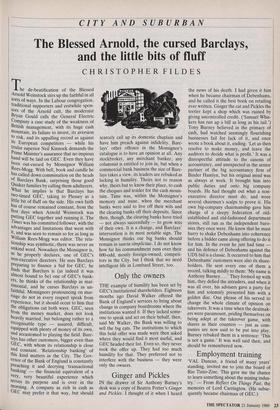CITY AND SUBURBAN
The Blessed Arnold, the cursed Barclays, and the little bits of fluff
CHRISTOPHER FILDES
The de-beatification of the Blessed Arnold Weinstock stirs up the faithful in all sorts of ways. In the Labour congregation. traditional supporters and erstwhile spon- sors of the Arnold cult, the modernist Bryan Gould calls the General Electric Company a case study of the weakness of British management, with its huge cash mountain, its failure to invest, its aversion to risk, and its appalling record as against its European competitors — while his titular superior Neil Kinnock demands the Prime Minister's assurance that no impious hand will be laid on GEC. Even they have been out-cursed by Monsignor William Rees-Mogg. With bell, book and candle he has called down commination on the heads of Barclays Bank, surprising those good Quaker families by calling them adulterers. What he implies is that Barclays has iw. o-timed GEC, taking to Plessey as a little bit of fluff on the side. His own faith has of course remained constant, from the first days when Arnold Weinstock was Putting GEC together and running it. The Times was his committed follower, with the advantages and limitations that went with it, and was seen to remain so for as long as William Rees-Mogg was editor. The rela- tionship was symbiotic,•there was never an unkind word. Nowadays the Monsignor is, as he properly declares, one of GEC's non-executive directors. He sees Barclays Preparing to finance a bid for GEC, he Ends that Barclays is (as indeed it was almost bound to be) one of GEC's bank- ers, he thinks of the relationship as mat- rimonial, and he curses Barclays as un- faithful. Monsignors pronouncing on mar- riage do not in every respect speak from experience, but it should occur to him that the obligations cut both ways. GEC, seen from the money market, does not look heavily married, but belonging rather to a recognisable type — assured, difficult, equipped with plenty of money of its own, and accustomed to playing the field. Barc- lays has other customers, bigger even than GEC, with whom its relationship is close and constant. 'Relationship banking' of this kind matters in the City. The Gov- ernor of the Bank of England is constantly Preaching it and decrying 'transactional banking' — the financial equivalent of a very, very beautiful experience which serves its purpose and is over in the Morning. A company as rich in cash as GEC may prefer it that way, but should scarcely call up its domestic chaplain and have him preach against infidelity. Barc- lays' other offence in the Monsignor's catalogue is to have an opinion at all. Any stockbroker, any merchant banker, any columnist is entitled to join in, but when a commercial bank business the size of Barc- lays takes a view, its leaders are rebuked as lacking in humility. Theirs not to reason why, theirs but to know their place, to cash the cheques and tender for the cash moun- tain. Time was, within the Monsignor's memory and mine, when the merchant banks were said to live off their wits and the clearing banks off their deposits. Since then, though, the clearing banks have tried — not always successfully — to grow wits of their own. It is a change, and Barclays' intervention is its most notable sign. The Monsignor thinks our big banks should remain in sancta simplicitas. I do not know how far his commandment runs over their 600-odd, mostly foreign-owned, competi- tors in the City, but I think that we need intelligent life in Lombard Street, too.


























































 Previous page
Previous page